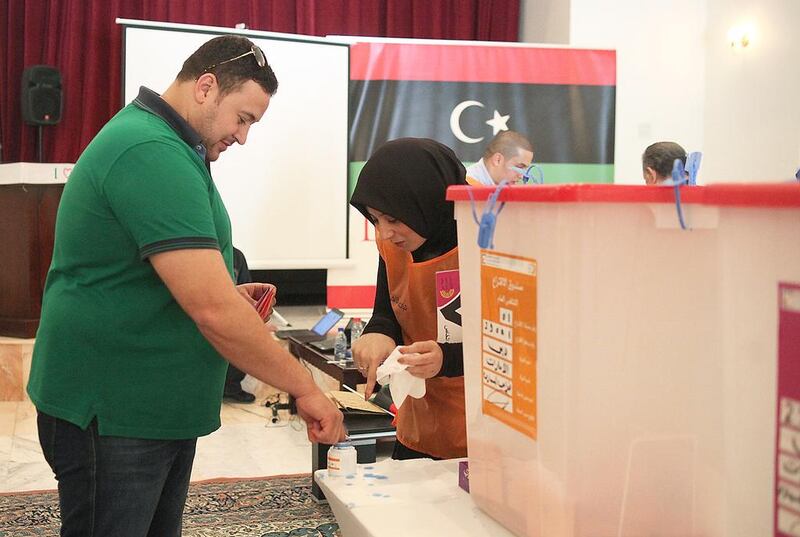Dubai // Libyan expatriates gathered at their consulate in Dubai yesterday to cast their vote to elect 200 members of the house of representatives.
The 612 Libyans registered to vote each cast their ballots for a male and female candidate from among 1,628 candidates.
The house of representatives will replace the general national congress, elected in 2012, that was responsible for drafting Libya’s constitution.
“We are looking for a future … we hope to better the country,” said Emhemed Shadi, 59.
Ibtehle Dugdug, 42, also voiced hope for Libya. She said the election was an experiment because it was the first such poll since the revolution that overthrew Muammar Qaddafi in 2011.
“We feel hopeful that there will be a future,” said Ms Dugdug, adding that Libyans’ goal was to have a better future with more chances for people than in the past.
Majda Annaihum, a Libyan adviser for external voting, said the country was undergoing a transition to democracy.
Muayad Buruin, 40, said he was proud to vote in the election.
“I feel very happy and proud to come here and to vote for whoever I see is best for this position,” he said, adding that the poll could be viewed as the last hope for Libyans.
“The situation is too bad, and I see this as a chance to get out of the troubles. This is hopefully the best chance for us.”
Mr Buruin said the key differences between this year’s election and previous votes was that this year’s candidates were independent of any groups who could influence them, and that there would be more elected parliamentary representatives than in the past.
Mahmoud Korayem, 28, said his compatriots had been indecisive and confused about who to vote for in the past, but he said he hoped this year’s election would mark a turning point.
Hanan Aburawi, 27, a first-time voter, said: “It feels weird and strange that we are going through the process that we see on television that all other democratic countries go through, like choosing names and putting the tick ... it feels really great.”
She said it was amazing that Libya had reached this stage of democracy after many years.
“We are really happy that things are finally moving forward,” she said. “We have a huge number of people who put forward their names, and the great thing is that even here in the UAE, we get to vote and our votes still count.”
The election in Dubai ends today.
Libyans in the UAE must register online to vote and they need to have a Libyan identity card.
A voter gets to cast his or her ballots for one male candidate in the general race and one candidate in the women’s race.
Thirty parliamentary seats will be allocated to women.
The Libyan consulate has posted on the walls of its voting room a list of all the candidates that voters can refer to when choosing who to vote for.
In Libya, the election will take place on Wednesday and the results are expected to be announced that same day.
nbakhsh@thenational.ae






